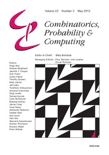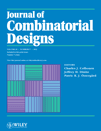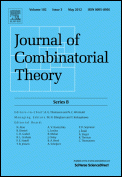
GRAPHS AND COMBINATORICS
Scope & Guideline
Connecting researchers through groundbreaking combinatorial insights.
Introduction
Aims and Scopes
- Graph Theory:
Focus on the foundational aspects of graph theory, including properties of different types of graphs, graph coloring, connectivity, and domination. - Combinatorial Structures:
Research on combinatorial designs, configurations, and arrangements that relate to graph theory, including hypergraphs and matroids. - Algorithm Development:
Emphasis on the creation and analysis of algorithms for solving graph-related problems, particularly in computational graph theory. - Extremal Graph Theory:
Study of extremal problems in graph theory, such as Turán-type problems and Ramsey theory, which investigate the conditions under which certain properties hold. - Spectral Graph Theory:
Exploration of the relationships between graph spectra and graph properties, investigating how eigenvalues and eigenvectors can inform us about graph structure. - Applications of Graph Theory:
Application of graph theoretical concepts to other fields such as computer science, biology, and social networks, showcasing interdisciplinary connections.
Trending and Emerging
- Dynamic and Adaptive Graph Algorithms:
An increasing focus on algorithms that adapt to changes in graph structures over time, reflecting real-world applications like network resilience and dynamic data analysis. - Random Graph Theory:
Growing interest in the properties of random graphs, particularly in connection with probabilistic methods and their implications for graph behavior under random conditions. - Graph Neural Networks and Machine Learning:
Emerging research on the application of graph theory to machine learning and neural networks, exploring how graph structures can enhance learning algorithms and data representation. - Topological Graph Theory:
Increased exploration of the connections between topology and graph theory, including studies on embeddings, planar graphs, and topological properties. - Interdisciplinary Applications:
A trend towards applying graph theoretical concepts to various fields, such as biology, sociology, and computer science, indicating a broader impact of graph theory in solving real-world problems.
Declining or Waning
- Classical Graph Coloring Problems:
Traditional coloring problems, while still relevant, appear to be receiving less emphasis compared to newer, more complex variations of graph coloring and dynamic coloring methods. - Elementary Graph Algorithms:
Basic algorithms for fundamental graph problems are becoming less frequently published, potentially overshadowed by more sophisticated approaches and applications in computational complexity. - Basic Extremal Graph Theory:
Foundational extremal graph theory topics, such as simple Turán problems, are less prominent as researchers explore more complex and nuanced variations of these problems. - Geometric Graph Theory:
Research focused on geometric aspects of graphs, such as intersection graphs and geometric representations, has seen a decrease in popularity, possibly due to a shift towards abstract combinatorial approaches.
Similar Journals

Journal of Combinatorics
Pioneering Discoveries in Combinatorial OptimizationJournal of Combinatorics is a premier academic journal dedicated to advancing the field of combinatorial theory and its applications. Published by INT PRESS BOSTON, INC, it aims to provide a robust platform for researchers, professionals, and students to disseminate their findings and engage with cutting-edge developments in combinatorics. With a focus on high-quality, peer-reviewed articles, the journal fosters rigorous mathematical discussions surrounding various facets of combinatorial structures, graph theory, design theory, and combinatorial optimization. Although currently not available as an Open Access journal, the Journal of Combinatorics plays a vital role in enriching the mathematical sciences and serves as an essential resource for academics seeking to stay updated with the latest trends in combinatorial research. By maintaining a commitment to excellence and innovation, this journal is indispensable for anyone looking to deepen their understanding in this critical area of study.

COMBINATORICS PROBABILITY & COMPUTING
Exploring the Intersection of Mathematics and ComputingCOMBINATORICS PROBABILITY & COMPUTING is a premier journal published by Cambridge University Press, focusing on the cutting-edge fields of combinatorics, probability, and their computational aspects. Established in 1992 and set to continue its impactful discourse through 2024, this journal holds a distinguished reputation, reflected in its Q1 ranking in applied mathematics, computational theory, and statistics, showcasing its pivotal role in advancing research in these areas. With an ISSN of 0963-5483 and an E-ISSN of 1469-2163, the journal welcomes high-quality papers that contribute to the theoretical foundations and practical applications of the disciplines. While it is not available as open access, its accessibility through institutional subscriptions ensures wide readership within academia. The journal is a vital resource for researchers, professionals, and students alike, providing a platform for innovative ideas and pioneering research that shapes the future of mathematics and computer science.

FUNDAMENTA INFORMATICAE
Advancing the Frontiers of Informatics and Mathematics.FUNDAMENTA INFORMATICAE is a distinguished academic journal published by IOS PRESS, focusing on the critical intersection of informatics, mathematics, and computer science. Since its inception in 1988, this journal has served as a vital resource for researchers and professionals alike, providing a platform for innovative studies in Algebra and Number Theory, Computational Theory and Mathematics, Information Systems, and Theoretical Computer Science. With an impressive HIndex, and ranking in the Q3 and Q4 categories across various disciplines as of 2023, it underscores its contribution and relevance in advancing the body of knowledge in these fields. The journal's commitment to excellence is reflected not only in its rigorous peer-review process but also in its notable rankings on Scopus, which positions it favorably among its peers. Though not yet available as an open access journal, FUNDAMENTA INFORMATICAE remains a crucial academic venue for authors wishing to disseminate their findings to a global audience, promoting collaboration and further research within the scientific community.

COMPTES RENDUS MATHEMATIQUE
Exploring the depths of mathematical innovation.COMPTES RENDUS MATHEMATIQUE is an esteemed open-access journal published by ACAD SCIENCES, dedicated to advancing the field of mathematics. Founded in France, this journal has established itself as a vital platform for scholarly communication within the mathematical community, receiving a commendable Q2 ranking in Mathematics (Miscellaneous) for 2023, reflective of its commitment to high-quality research dissemination. The journal’s impact is further underscored by its position within the Scopus rankings, where it is recognized among the top 205 out of 399 journals in the broader category of General Mathematics. With an open-access model launched in 2020, COMPTES RENDUS MATHEMATIQUE ensures that research is widely accessible, promoting collaboration and innovation within academia. Covering a wide range of mathematical disciplines, it welcomes contributions that push the boundaries of knowledge in the field. The journal's convergence of issues from 2002 to 2024 positions it as a reliable source of foundational and cutting-edge mathematics research, appealing to researchers, professionals, and students alike. Its address is located in the heart of Paris at 23 Quai de Conti, 75006, France, reinforcing its legacy in a city renowned for its scholarly contributions.

Contributions to Discrete Mathematics
Innovating the discourse in discrete mathematics.Contributions to Discrete Mathematics, published by the Department of Mathematics and Statistics at the University of Calgary, serves as a vital platform for disseminating innovative research within the dynamic field of discrete mathematics and combinatorics. Established in 2008, this journal has rapidly gained recognition, currently holding a Q3 classification in discrete mathematics and combinatorics for 2023. As it aims to foster academic dialogue and share groundbreaking discoveries, the journal showcases high-quality peer-reviewed articles that cover a range of topics, from theoretical explorations to practical applications. Although it currently operates under a traditional subscription model, there is a growing commitment to enhancing access options, ensuring that critical knowledge is available to researchers and practitioners alike. With its notable Scopus ranking of #50 out of 92 within its category, this journal is positioned as an important resource for students, academics, and industry professionals who seek to stay at the forefront of discrete mathematics research.

Commentationes Mathematicae Universitatis Carolinae
Exploring Diverse Mathematical FrontiersCommentationes Mathematicae Universitatis Carolinae, with ISSN 0010-2628 and E-ISSN 1213-7243, is a distinguished academic journal published by the Faculty of Mathematics and Physics at Charles University in the Czech Republic. Established in 1996, this journal serves as a platform for original research articles and contributions in the field of mathematics, catering to a diverse range of topics within the discipline. While classified in the Q4 quartile for 2023, it occupies an important niche within the mathematical community, particularly for emerging research and comprehensive studies. Although it is not open access, it offers authors an opportunity to disseminate their work through a reputable publisher, renowned for its scholarly contributions. With a focus on fostering academic discourse, Commentationes Mathematicae aims to engage researchers, professionals, and students alike, enriching the mathematical landscape and promoting collaboration within the field.

DISCRETE MATHEMATICS
Connecting scholars through rigorous peer-reviewed research.DISCRETE MATHEMATICS, published by Elsevier, is a leading journal dedicated to the field of discrete mathematics and combinatorics, with a distinguished presence in the academic community since its inception in 1971. With an ISSN of 0012-365X and an E-ISSN of 1872-681X, this esteemed journal has firmly established itself within the Q1 category for Discrete Mathematics and Combinatorics, and Q2 for Theoretical Computer Science as per the 2023 metrics, underscoring its pivotal role in advancing research in these vital areas. DISCRETE MATHEMATICS is highly regarded, reflected in its Scopus rankings, where it stands at #44 out of 92 in its primary category, contributing significantly to the global discourse on complex mathematical theories and applications. Published from the Netherlands, the journal serves as a crucial resource for researchers, professionals, and students looking to stay informed about the latest innovations and methodologies in discrete mathematics. Though currently not an open-access journal, DISCRETE MATHEMATICS continues to foster a vibrant scholarly community through rigorous peer-reviewed research, promoting a deeper understanding of the mathematical structures that underpin both theoretical and applied science.

JOURNAL OF COMBINATORIAL DESIGNS
Advancing the Frontiers of Combinatorial KnowledgeJOURNAL OF COMBINATORIAL DESIGNS, published by Wiley, is a leading peer-reviewed journal that serves as a vital platform for researchers in the field of discrete mathematics and combinatorics. With an impressive Q1 ranking in the 2023 category, it stands at the forefront of academic discourse, showcasing significant developments and innovative research from 1993 to 2024. The journal is dedicated to the study of combinatorial designs, including their applications in various scientific disciplines, which enhances its relevance among mathematicians and applied scientists alike. Although it operates on a traditional subscription model, the journal continues to attract high-quality submissions, as evidenced by its Scopus rank of #40 out of 92 in Discrete Mathematics and Combinatorics, placing it in the 57th percentile. Its commitment to advancing knowledge in combinatorial theory and applications makes it an essential resource for professionals, researchers, and students seeking to deepen their understanding and contribute to this dynamic field.

ARS Mathematica Contemporanea
Connecting Scholars Through Open Access ResearchARS Mathematica Contemporanea, published by UP FAMNIT in Slovenia, stands as a pivotal journal within the fields of algebra, number theory, discrete mathematics, geometric topology, and theoretical computer science. Since its inception in 2011, this journal has consistently provided a rich platform for innovative research, garnering a commendable Q2 category ranking in various mathematical domains, including Algebra and Number Theory, and Geometry and Topology, showcasing its growing influence and prestige in the academic community. With an increasing Scopus rank—particularly notable in Algebra and Number Theory at the 71st percentile—ARS Mathematica Contemporanea is dedicated to publishing high-quality, peer-reviewed content that advances the frontiers of mathematical knowledge. The journal’s commitment to open access ensures that valuable research is readily available to scholars, practitioners, and students alike, fostering collaboration and dissemination of ideas across the globe. As it converges towards its dedicated timeline extending to 2024, ARS Mathematica Contemporanea remains a crucial resource for those engaged in mathematical research, presenting an array of theoretical and practical insights that define contemporary mathematical discourse.

JOURNAL OF COMBINATORIAL THEORY SERIES B
Connecting Scholars Through Cutting-edge ResearchJOURNAL OF COMBINATORIAL THEORY SERIES B, published by Academic Press Inc., Elsevier Science, is an esteemed journal within the discipline of combinatorial theory, discrete mathematics, and theoretical computer science. With a rich history since its inception in 1971 and ongoing publication through 2025, this journal has established itself as a pillar in its field, currently holding Q1 category rankings in multiple areas including Computational Theory and Mathematics, Discrete Mathematics and Combinatorics, and Theoretical Computer Science. The journal features cutting-edge research and developments, attracting contributions from both established professionals and emerging scholars. Despite the absence of an open access option, the journal's strong impact reflected in its Scopus ranks—such as being number 16 out of 92 in Discrete Mathematics and Combinatorics (83rd percentile)—signifies its influential role in advancing knowledge and innovation. Researchers seeking to share impactful findings and connect with a vibrant academic community will find the JOURNAL OF COMBINATORIAL THEORY SERIES B an essential resource.